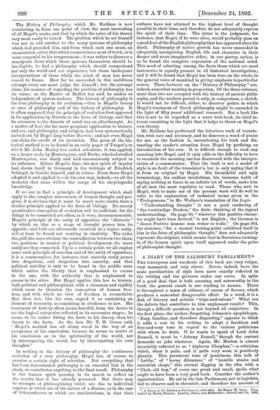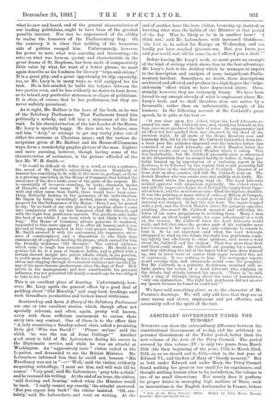A DIARY OF THE SALISBURY PARLIAMENT.* THE letterpress and woodcuts
of this book are very vulgar, very mannered, and very clever. Never, indeed, have the same peculiarities of style been more exactly reflected in the writing and the pictures under one cover. In spite of a good deal that is both amusing and noteworthy in the book, the general result is one tending to nausea. There is throughout a sense of oiliness, of excess of flavour, which produces a somewhat disagreeable effect. In a word, it is a dish of literary and artistic "tripe-and-onions." What are the defects that contribute to this unpleasant result ? This, though a difficult question, is not beyond all conjecture. In the first place, the author, forgetting Johnson's apophthegm, "Easy, familiar, and therefore disgusting," appears to think it adds a zest to his writing to adopt a facetious and free-and-easy tone in regard to the various politicians with whom he deals. If he wants to speak of Lord John Russell, it must be "Johnny Russell," though the context demands no joke whatever. Again, Mr. Morton is almost invariably referred to as "Alpheus Cleophas,"—a witticism which, when it palls, and it palls very soon, is positively ghastly. This persistent tone of jauntiness, this talk of " Labby," of "horny dilemmas," of "humble steaks and succulent chops," this eternal digging in the ribs, with a " Chck, old boy," of every one great and small, spoils what ought to have been a very good book. Consider the author's opportunities. He sat in the late Parliament, not to legislate, but to observe and to chronicle, and therefore his account of • A Diary of the Salisbury Parliament, .1886-2895. By Henry W. Lucy. Illus. trated by Harry Par:lies. London, Paris, and Melbourne Cassell and Co. 1895,
what he saw and heard, and of the general characteristics of our leading politicians, ought to have been of the greatest possible interest. Nor was he unpossessed of the ability to realise the humours of the Parliamentary fray. On the contrary, it is clear that nothing of the humorous side of politics escaped him. Unfortunately, however, his power to note what was amusing and interesting,—to seize on what was human, quaint, and characteristic in the great drama of St. Stephens, has been made of comparatively little value by what, for want of a better phrase, we must again describe as his fondness for literary "tripe-and-onions." It is a great pity, and a great opportunity let slip, especially, too, as Mr. Lucy is, in many ways, so well equipped for his task. He is fair-minded, he holds the balance between the two parties even, and he has evidently no desire to hunt down, • or to bela,ud, any particular statesman or clique of politicians.
It is clear, of course, that he has preferences, but they are never unfairly prominent.
As is right, Mr. Balfour is the hero of the book, as he was of the Salisbury Parliament. That Parliament found him politically a nobody, and left him a statesman of the first rank. In his characterisation of the late Leader of the House, Mr. Lucy is specially happy. He does not, we believe, once call him "Arty," or attempt to get any washy jokes out of either his surname or Christian name ; and the various de- scriptions given of Mr. Balfour and his House-of-Commons ways, form a wonderfully graphic picture of the man. Lighter and more amusing, however, though having some of the characteristics of caricature, is the picture afforded of the late Mr. W. H. Smith :—
"It would be difficult to define in a word, or even a sentence, the secret of Mr. Smith's astonishing success. Simplicity of manner has something to do with it, the more so, perhaps, as there is a growing conviction in the House of Commons that behind the innocence of the dove lurks some of the guile of the serpent. He is essentially of bourgeois standing, in looks, character, modes of thought, and even name. If he had chanced to be born with any other name than Smith, there would have been some- thing distinctly lacking in the symmetry of his individualism. He began by being exceedingly modest, almost suing in forma pauperis for the forbearance of the House. Here I am,' he seemed to say, 'by no fault of my own placed in a position where I come into comparison with my late lamented chief, Mr. Disraeli, and with the right hon. gentleman opposite. For goodness sake make the best of me whilst I am here, which is not likely to be very long.' The House of Commons, always generous to weakness, responded to this mute appeal. It is, after all, human, and it was pleased at being approached in this very proper manner. Then Mr. Smith amused it with his seriousness, his impressive utter- ance of commonplaces, and a disposition to cite little tags reminiscent of copybook heading literature, which earned for him the friendly nickname Old Morality.' The critical audience which came to laugh has remained to praise. Mr. Smith is no genius, but he is a man of business habits, and is gifted with a certain shrewd insight into public affairs, which, in his position, is worth more than eloquence. He has a way of conciliating oppo- sition and slipping through Government business not excelled by any of his more famous predecessors since the days of Peel. How astute in his management, and how considerable his personal influence, was not perceived till nearly a month ago he was obliged to take to his bed."
This is an excellent piece of drawing. Unfortunately, how- ever, Mr. Lucy spoils the general effect by a good deal of padding about "Old Morality," and copy-book headings, and such threadbare jocularities and broken-kneed witticisms.
Scattered up and down A Diary of the Salisbury Parliament are one or two excellent stories, which, though often not
specially relevant, and often, again, pretty well known, carry with them sufficient amusement to excuse their entry into any context. One of these is to the effect that "A lady examining a Sunday-school class, asked a promising little girl Who was David ? " Please, ma'am,' said the child, he was the son of Jesse Collings.'" Another g )od story is told of Mr. Labouchere during his career in the Diplomatic service, and while he was an attache at Washington. An "aggressively irate" visitor called at the Lsgation, and demanded to see the British Minister. Mr. Labouchere informed him that he could not, because "His Excellency was not in" :—" ' Well,' said the visitor, evidently suspecting subterfuge, I must see him, and will wait till he comes.' 'Very good,' said Mr. Labouchere, pray take a chair,' and he resumed his writing. At the end of an hour, the visitor, 'still fretting and fuming,' asked when the Minister would be back. ' I really cannot say exactly,' the attache answered. Bat you expect him back ?' the visitor insisted. Oh, cer- tainly,' said Mr. Labouchere, and went on writing. At the end of another hour the irate visitor, bouncing up, insisted on knowing what were the habits of the Minister at that period of the day. Was he likely to be in in another hour? I think not,' said Mr. Labouchere, with increased blandness ; the fact is, he sailed for Europe on Wednesday, and can hardly yet have reached Queenstown. But, you know, you said you would wait till he came in, so I offered you a chair.' " Before leaving Mr. Lucy's work, we must quote an example of the kind of writing which shows him to the best advantage. Mr. Lucy's forte is the drollery which he manages to impart to the description and analysis of some insignificant Parlia- mentary incident. Sometimes, no doubt, these descriptions are forced and affected, and produce in a high degree the " tripe- and-onion " effect which we have deprecated above. Occa- sionally, however, they are extremely funny. We have been forced to say enough already of what is unpleasant about Mr. Lucy's book, and we shall therefore close our notice by a favourable, rather than an unfavourable, example of his humour. In the following account of Mr. Caldwell's great speech, he is quite at his best :—
"It was close upon five o'clock when the Lord Advocate re- sumed his seat. Mr. Caldwell rose, and, steadying himself on his legs, once more produced the bale of notes. Its reappearance had an effect not less marked than was observed in the dead of the previous night. In all parts of the House Members rose and hurriedly fled, till by the time Mr. Caldwell had settled down into a level pace the audience dispersed over the benches before him consisted of one Lord Advocate, one Scotch Member below the gangway awake, and one Scotch Member above it asleep. This was inexplicable ; but Mr. Caldwell presently grew so interested in his disquisition that he seemed hardly to notice it, being pro- bably buoyed up by expectation of a verbatim report in the Scotsman, to be followed by the reprint that would presently fall like sunshine on the watering-places of Scotland. Quarter of an hour stole on after quarter, and still Mr. Caldwell went on. The Scotch Member who was awake rose and guiltily stole forth. His hon. friend above the gangway slept on. The Lord Advocate nodded approval with suspicious regularity. Six o'clock struck, and still the impressive figure stood behind the empty front Oppo- sition bench, and the monotonous voice filled the hapless chamber. It was like printing so many miles of calico at Milton of Campsie. Steam was up, and the engine would go round till the last yard of material was stamped. At last this was done. The engine stopped with a jerk, and the Scotch Member above the gangway opposite, awaking, discovered Mr. Caldwell reseated and collecting the folios of his notes preparatory to re-baling them. Many a man after such an effort would retire for some refreshment or a walk on the terrace. Mr. Caldwell knew the Lord Advocate would reply, and felt that since the greater part of his rejoinder must have reference to his speech it was only courteous to remain to hear it. So he sat expectant—and when the Lord Advocate attempted to wind up the debate the right hon. gentleman, reply- ing lightly but effectively to other speakers, said never a word about Mr. Caldwell and the oration ! That was more than flesh and blood could stand. Mr. Caldwell sat gasping for a moment, and then clutching the rail of the bench before him, drew himself up, and in tones more of sorrow than anger bewailed this act of contumacy. It was nothing to him. The newspaper reports would revenge him, and afterwards would come the pamphlet. But Mr. Caldwell, as a patriotic Scotchman, mourned with in- finite pathos the action of a Lord Advocate who, replying on the debate, had utterly ignored his speech. There is,' he said, with a ring of triumph rising above the notes of lamentation, only one explanation. The right hon. gentleman did not answer my speech because he found he could not.' " We have said something above as to the character of Mr. Farniss's drawings. We will only add here that they are at once coarse and clever, unpleasant and yet effective, and accurately reflect the spirit of the text.



































 Previous page
Previous page